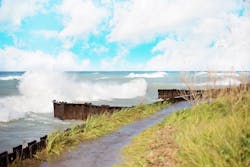Waukesha, Wisc., May Divert Great Lakes Water to New Industrial Plant
The Taiwan-based company Foxconn Technology Group is opening a new plant in Waukesha, Wisc., that would see the company siphon water from Lake Michigan nearing an amount of 7 million gal per day (gpd).
However, this new development brings into question the details of the Great Lakes Compact, and agreement made by Great Lake states to protect their waters from outside areas who may be experiencing scarcities. Whether or not this new proposal violates the terms of this agreement remains to be seen.
The issue arrives as an unprecedented problem for the agreement, as it is unknown whether or not Wisconsin must consult and achieve the approval of other states in order to move forward with plans for the plant. The company was heavily courted by Michigan, Ohio and Wisconsin, but was won over by the latter state when Gov. Scott Walker offered $3 billion in taxpayer subsidies and ensured the relaxation of state environmental laws should the company decide to set up shop in the state.
“A lot of people are upset with the hubris with which Wisconsin has been dismissing environmental laws in order to grease the wheels for Foxconn,” said Peter Annin, co-director of a Northland College water center. “The compact language does appear to provide an opportunity for opponents to trip things up. The fact that Walker is up for re-election this year makes the geopolitical dynamic here even more intriguing.”
While the company would be drawing over 7 million gpd, only 4.3 million gal would be returned to Lake Michigan after being properly treated. The remaining amount would be lost to evaporation in the company’s cooling system. The company may also be required to treat wastewater at its own factory, removing any hazardous chemicals before forwarding the water to the treatment plant in Racine, Wisc., where it will subsequently be released back into the lake.
